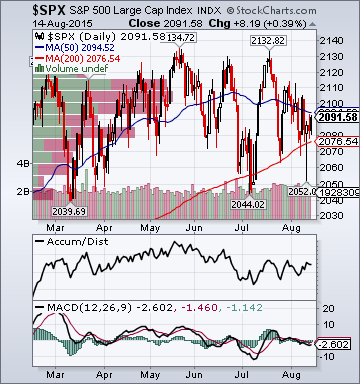Indices
- Russell 2000 1,211.51 +.37%
- S&P 500 High Beta 32.0 +.72%
- Goldman 50 Most Shorted 130.87 -.88%
- Wilshire 5000 21,808.50 +.68%
- Russell 1000 Growth 1,015.64 +.56%
- Russell 1000 Value 1,009.95 +.85%
- S&P 500 Consumer Staples 513.93 unch.
- Solactive US Cyclical 128.17 +.47%
- Morgan Stanley Technology 1,074.44 +.73%
- Transports 8,318.82 +.85%
- Bloomberg European Bank/Financial Services 115.38 -3.24%
- MSCI Emerging Markets 35.57 -2.44%
- HFRX Equity Hedge 1,196.41 -.67%
- HFRX Equity Market Neutral 1,004.32 -.49%
Sentiment/Internals
- NYSE Cumulative A/D Line 231,601 -.18%
- Bloomberg New Highs-Lows Index -393 +277
- Bloomberg Crude Oil % Bulls 34.15 +298.5%
- CFTC Oil Net Speculative Position 247,093 n/a
- CFTC Oil Total Open Interest 1,736,523 n/a
- Total Put/Call 1.05 -13.01%
- ISE Sentiment 99.0 +55.36%
- Volatility(VIX) 13.07 -1.86%
- S&P 500 Implied Correlation 55.36 +1.26%
- G7 Currency Volatility (VXY) 9.1 -2.57%
- Emerging Markets Currency Volatility (EM-VXY) 10.75 +14.4%
- Smart Money Flow Index 16,981.29 +1.41%
- ICI Money Mkt Mutual Fund Assets $2.675 Trillion +.2%
- ICI US Equity Weekly Net New Cash Flow -$7.303 Billion
Futures Spot Prices
- Reformulated Gasoline 168.81 +3.7%
- Bloomberg Base Metals Index 148.44 unch.
- US No. 1 Heavy Melt Scrap Steel 231.47 USD/Ton -2.2%
- China Iron Ore Spot 56.74 USD/Ton +.6%
- UBS-Bloomberg Agriculture 1,041.86 -1.46%
Economy
- ECRI Weekly Leading Economic Index Growth Rate .2% unch.
- Philly Fed ADS Real-Time Business Conditions Index .0365 -5.93%
- S&P 500 Blended Forward 12 Months Mean EPS Estimate 126.19 +.18%
- Citi US Economic Surprise Index -4.4 +3.8 points
- Citi Eurozone Economic Surprise Index 8.8 -6.2 points
- Citi Emerging Markets Economic Surprise Index -6.3 -2.8 points
- Fed Fund Futures imply 50.0% chance of no change, 50.0% chance of 25 basis point hike on 9/17
- # of Months to 1st Fed Rate Hike(Morgan Stanley) 3.68 -2.13%
- US Dollar Index 96.55 -1.01%
- Euro/Yen Carry Return Index 144.29 +1.4%
- Yield Curve 147.0 +2.0 basis points
- 10-Year US Treasury Yield 2.20% +3.0 basis points
- Federal Reserve's Balance Sheet $4.451 Trillion +.05%
- U.S. Sovereign Debt Credit Default Swap 16.5 unch.
- Illinois Municipal Debt Credit Default Swap 228.0 -7.4%
- Western Europe Sovereign Debt Credit Default Swap Index 22.37 -.49%
- Asia Pacific Sovereign Debt Credit Default Swap Index 69.97 +7.23%
- Emerging Markets Sovereign Debt CDS Index 307.65 +1.34%
- Israel Sovereign Debt Credit Default Swap 66.45 +1.05%
- Iraq Sovereign Debt Credit Default Swap 684.92 -1.88%
- Russia Sovereign Debt Credit Default Swap 374.16 +2.76%
- iBoxx Offshore RMB China Corporates High Yield Index 119.38 -1.33%
- 10-Year TIPS Spread 1.63% -3.0 basis points
- TED Spread 23.0 -5.0 basis points
- 2-Year Swap Spread 24.25 -.5 basis point
- 3-Month EUR/USD Cross-Currency Basis Swap -20.75 -.25 basis point
- N. America Investment Grade Credit Default Swap Index 76.8 +1.77%
- America Energy Sector High-Yield Credit Default Swap Index 1,902.0 +3.34%
- European Financial Sector Credit Default Swap Index 76.40 -.22%
- Emerging Markets Credit Default Swap Index 343.30 +2.04%
- CMBS AAA Super Senior 10-Year Treasury Spread to Swaps 103.0 +7.0 basis points
- M1 Money Supply $3.117 Trillion +2.91%
- Commercial Paper Outstanding 1,058.80 -.80%
- 4-Week Moving Average of Jobless Claims 266,250 -2,000
- Continuing Claims Unemployment Rate 1.7% unch.
- Average 30-Year Mortgage Rate 3.94% +3 basis points
- Weekly Mortgage Applications 397.50 +.08%
- Bloomberg Consumer Comfort 40.7 +.4 point
- Weekly Retail Sales +1.90% +60.0 basis points
- Nationwide Gas $2.65/gallon +.03/gallon
- Baltic Dry Index 1,046.0 -12.83%
- China (Export) Containerized Freight Index 819.62 +2.59%
- Oil Tanker Rate(Arabian Gulf to U.S. Gulf Coast) 25.0 -9.09%
- Rail Freight Carloads 274,424 +1.84%
Best Performing Style
Worst Performing Style
Leading Sectors
Lagging Sectors
Weekly High-Volume Stock Gainers (20)
- W, YDLE, SYA, STMP, ICUI, CVT, POST, PCP, HCKT, NVAX, TWOU, NVDA, NUS, OME, BGG, AAP, AEL, CREE, SYY and AGX
Weekly High-Volume Stock Losers (42)
- STCK, DF, RRGB, BID, MMS, RAX, WK, KSS, HALO, NHI, INCR, PRAA, DTSI,
APEI, AHP, OLED, CTRE, TUBE, NGHC, SUNE, TPC, FRPT, EVDY, UVV, SHAK,
BLUE, LJPC, ZBRA, IMDZ, BCRX, EGRX, ENV, RENT, XON, RLYP, CLDX, LXU,
ASCMA, ICON, WRLD, FLDM and KPTI
Weekly Charts
ETFs
Stocks
*5-Day Change
